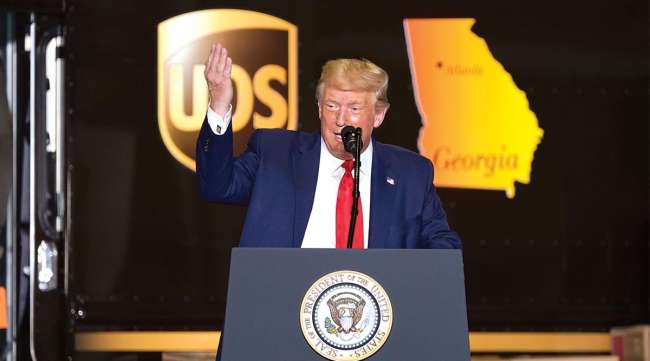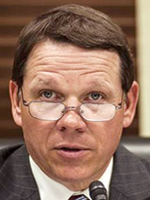Senior Reporter
ATA Lauds Trump’s Environmental Permitting Reforms

[Stay on top of transportation news: Get TTNews in your inbox.]
President Donald Trump’s push to advance infrastructure projects through environmental permitting changes earned broad support across the freight industry.
At UPS Inc.’s prominent hub in Atlanta on July 15, the president outlined reforms to the National Environmental Policy Act, a decades-old law he has targeted throughout his administration. Critics of the law argued it impeded big-scale projects and hindered regional economies. Proponents viewed it as a shield.
“This is good news for truckers, the motoring public, our economy and the environment,” American Trucking Associations President Chris Spear said in a statement. “It currently takes an average of seven years for a highway construction project to get through federal permitting, which is counterproductive in the extreme. This cumbersome review process presents an enormous obstacle to modernizing our outdated infrastructure, contributing to more traffic congestion and the harmful emissions that come with it.”

Guillot
Added ATA Chairman Randy Guillot, president of Triple G Express and Southeastern Motor Freight: “Infrastructure investment is a surefire way to reduce our nation’s environmental impact, and this action by President Trump will help accelerate construction projects that reduce waste and result in a more efficient and resilient supply chain and transportation system for decades to come.”
ATA has insisted on the need for greater attention to the country’s infrastructure networks, emphasizing the trucking industry loses about $74 billion annually due to traffic congestion on the highway system. Groups such as the U.S. Chamber of Commerce, and others representing various sectors, backed Trump’s calls to update environmental regulations. They also continue to urge additional funding for transportation improvement projects.
As part of the president’s focus on NEPA, the administration announced its final rule is meant to modernize and accelerate environmental reviews, the objective of which is to improve efficiency and affordability. The rule codifies certain court decisions to clarify directives, and it aims to enhance public input in reviews.
LIVE: President @realDonaldTrump delivers remarks on infrastructure https://t.co/2ibW6VSnwm — The White House (@WhiteHouse) July 15, 2020
Additionally, the rule realizes Trump’s aim for a “one federal decision” approach to permitting, essentially establishing a two-year period for completion of certain environmental impact statements, and a year for completion of environmental assessments.
In justifying the move, the Council on Environmental Quality noted such impact statements for highway projects on average take more than seven years.
“By streamlining infrastructure approvals, we’ll further expand America’s unprecedented economic boom,” said Trump, who pledged to ensure the country’s infrastructure becomes the “envy of the entire world.” This year, he has yet to outline a long-term funding plan that would assist with rebuilding structurally deficient bridges, and inefficient freight and commuter corridors.

How can fleet managers harness technology to get a better handle on vehicle speed and improve their safety culture? Host Seth Clevenger speaks with Mathieu Boivin of E-Smart and Jonathan Hubbard of SpeedGauge. Hear a snippet, above, and get the full program by going to RoadSigns.TTNews.com.
On Capitol Hill, key Republican transportation leaders praised the president’s final rule on NEPA.
“President Trump is cutting red tape to help get our economy back in the black,” said Sen. John Barrasso (R-Wyo.), chairman of the Environment and Public Works Committee. Last year, his panel gave unanimous approval to a five-year, $287 billion highway policy bill that included provisions meant to codify key aspects of the president’s “one federal decision” vision. But before that bill is able to reauthorize a soon-to-expire highway law, it needs input from committees with jurisdiction on tax policy, freight transportation and transit.
“These updates will make the National Environmental Policy Act work better for the American people,” Barrasso said. “Right now, important construction projects are being slowed down because of lengthy government permitting processes and lawsuits. The administration is making this process more predictable and efficient. We can protect the environment and move our economy forward at the same time. This rule gets that done.”

Graves
Added Rep. Sam Graves (R-Mo.), the top Republican on the House transportation panel, “Updating NEPA will save taxpayers’ money while maintaining necessary protections for the environment, public safety and human health.”
A number of Democrats, however, have pushed back on the president’s efforts. In a recent House-passed $1.5 trillion infrastructure bill, Democrats sought to strengthen climate change guidelines related to new infrastructure projects.

Carper
Sen. Tom Carper (D-Del.), ranking member on the Environment and Public Works Committee, championed a climate-centric section in Barrasso’s highway bill.
“As humanity faces the greatest environmental challenge of our time, the fight to save our planet from climate change, we must work together to find lasting solutions,” Carper said. “This highly divisive, harmful and partisan rollback will not last.”
Bill Taylor, vice president of corporate transportation at UPS, welcomed the president to the company’s facility.
“From UPS’ standpoint, we’re all tremendously proud to help deliver life-saving supplies wherever and whenever they are needed,” he said. “Improvements in our infrastructure would be a tremendous benefit to not only our customers but also the communities that we serve.”
UPS Inc. ranks No. 1 on the Transport Topics Top 100 list of the largest for-hire carriers in North America.
Want more news? Listen to today's daily briefing:
Subscribe: Apple Podcasts | Spotify | Amazon Alexa | Google Assistant | More




